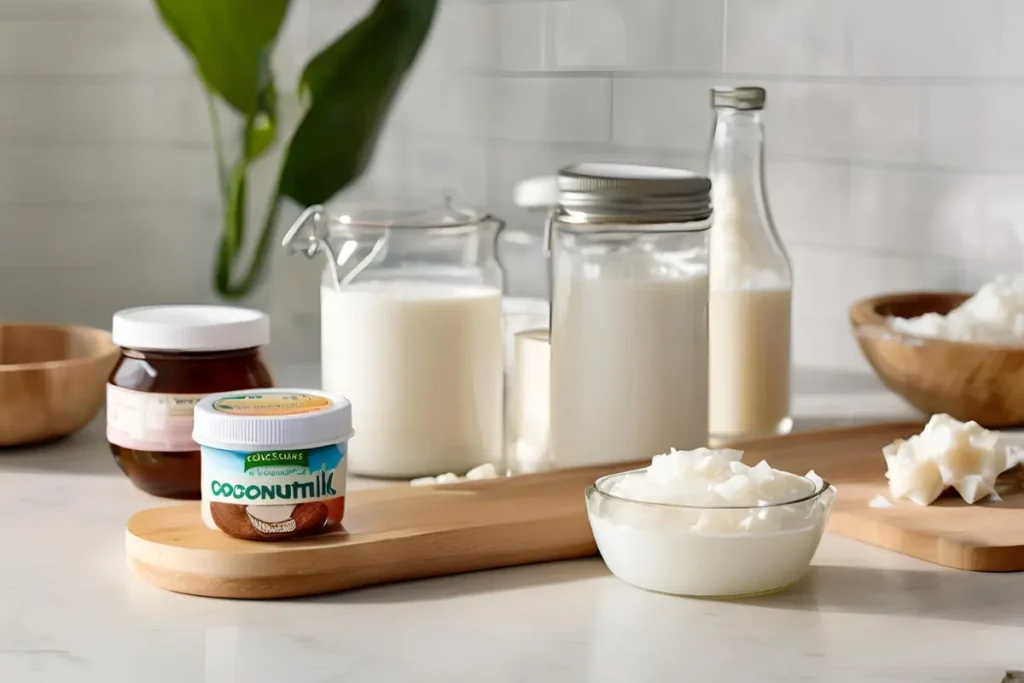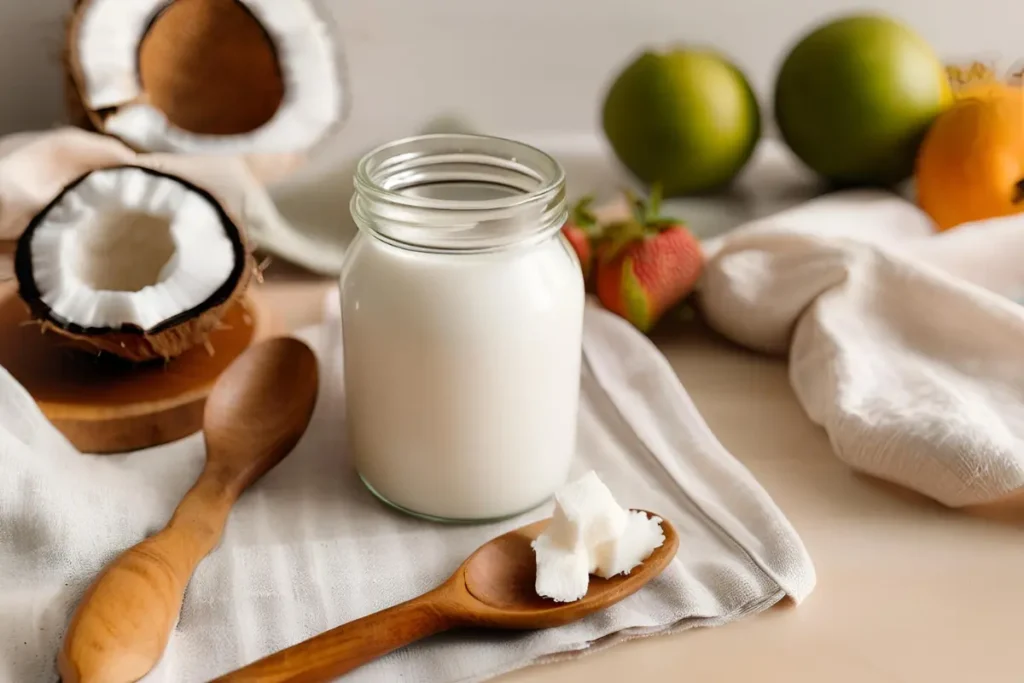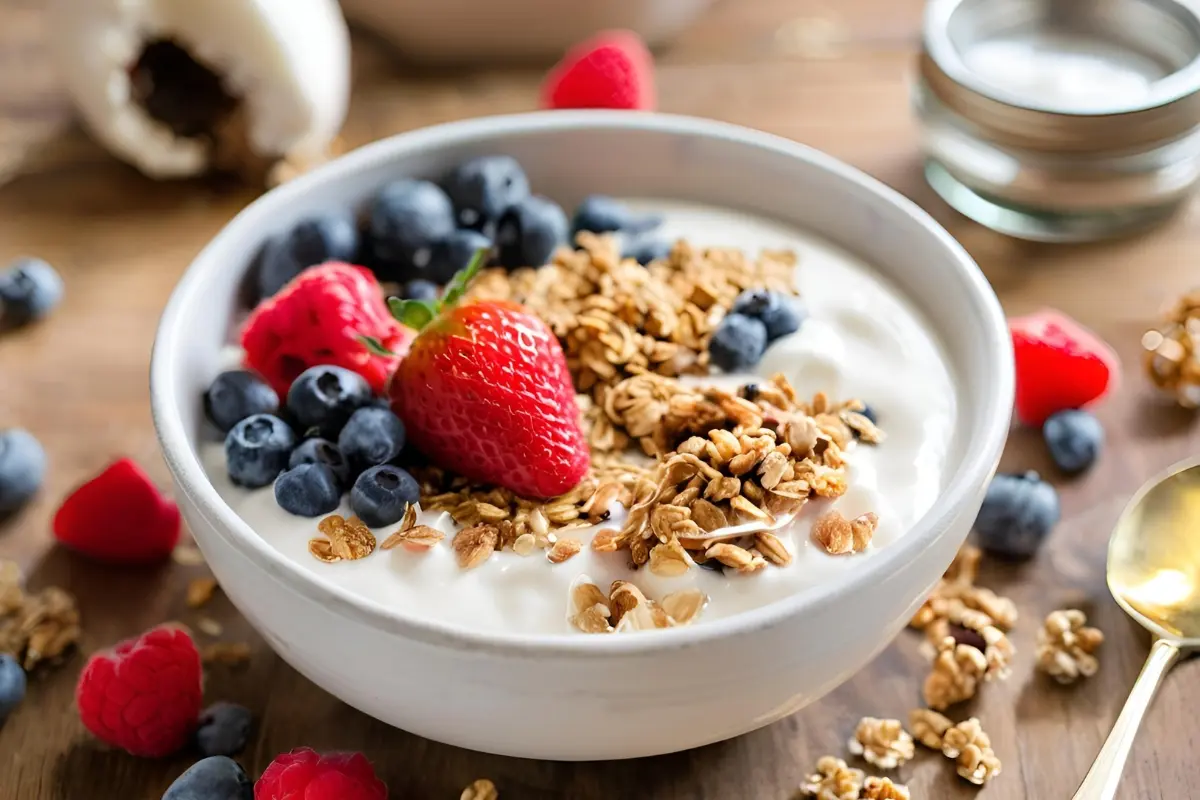Coconut yogurt recipe lovers, this one’s for you. I still remember the first time I swapped my usual Greek yogurt for a homemade coconut version—one spoonful, and I was hooked. Creamy, tangy, and just a little tropical, it felt like dessert disguised as breakfast. Whether you’re vegan, lactose-intolerant, or simply chasing new flavors, coconut yogurt delivers on taste, texture, and versatility. In this guide, we’ll explore why it’s worth making at home, the health perks you’ll love, and the simple steps to get that perfect, velvety spoonful every time.
Understanding Coconut Yogurt
What is Coconut Yogurt?
“Coconut Yogurt Recipe” is a creamy and tangy alternative to traditional dairy-based yogurts. Made from coconut milk, it serves as an excellent plant-based option for individuals with dietary restrictions or those seeking to adopt a vegan lifestyle. Unlike dairy yogurt, which relies on lactose for fermentation, coconut yogurt is created by fermenting coconut milk with live probiotic cultures. The result is a deliciously versatile food with a rich texture and subtle sweetness.
This dairy-free delight has gained traction among health-conscious consumers due to its nutritional profile, which includes healthy fats, probiotics, and the absence of lactose, making it suitable for people with lactose intolerance.
The Growing Popularity of Plant-Based Yogurts
The rise in popularity of plant-based diets has fueled an explosion in the market for non-dairy yogurts. According to market research, plant-based yogurt sales in the U.S. have grown by over 20% annually in recent years, driven by demand for vegan and allergen-free products. Coconut yogurt, with its creamy consistency and exotic appeal, stands out as a favorite among these options. It aligns perfectly with trends like clean eating, sustainability, and the increasing preference for minimally processed foods.
If you’re interested in exploring the broader world of plant-based yogurts, check out resources like Plant-Based Foods Association for insightful data and trends.
Is Coconut Yogurt Healthy?
Nutritional Benefits of Coconut Yogurt
Coconut yogurt is packed with nutritional benefits that appeal to a variety of diets. Here are some key advantages:
- Rich in Healthy Fats: Coconut yogurt contains medium-chain triglycerides (MCTs), which are easily digestible fats known for providing quick energy and supporting weight management.
- Probiotic-Rich: Like traditional yogurt, coconut yogurt contains live cultures that promote gut health by supporting the balance of good bacteria in the digestive system.
- Low Allergen Risk: Being dairy-free and nut-free, coconut yogurt is a safe choice for individuals with common allergies.
In addition, coconut yogurt often includes added vitamins like B12 and D, enhancing its nutritional value. However, it’s important to choose varieties with minimal added sugars to maximize health benefits.
Comparing Coconut Yogurt to Dairy-Based Options
Coconut yogurt offers several advantages over its dairy counterparts. For one, it is naturally lactose-free, making it suitable for those with lactose intolerance. It’s also free of casein, a protein found in cow’s milk that can trigger allergies in some individuals. From a calorie perspective, coconut yogurt tends to have a higher fat content but fewer carbohydrates than traditional yogurt, making it a favorite for keto and paleo diets.
That said, dairy yogurts like Greek yogurt boast higher protein levels. Adding plant-based protein powders or consuming coconut yogurt alongside protein-rich foods can help balance this gap for those prioritizing protein intake.
Addressing Common Misconceptions
It’s common to assume that all coconut yogurts are healthy, but not all products are created equal. Many store-bought options are laden with added sugars, artificial flavors, and preservatives. Additionally, some people believe coconut yogurt lacks the “tanginess” of dairy yogurt, but this can vary based on fermentation duration and the specific probiotic strains used.
When purchasing coconut yogurt, always read labels carefully and opt for brands prioritizing clean ingredients. Alternatively, making it at home ensures full control over what goes into your yogurt.
Making Coconut Yogurt at Home
Ingredients Needed for Homemade Coconut Yogurt
Making coconut yogurt at home is a rewarding process that allows you to control its flavor, texture, and nutritional profile. Here’s a breakdown of the essential and optional ingredients:

Essential Ingredients: Coconut Milk, Probiotics, and Thickeners
- Coconut Milk:
The foundation of coconut yogurt, coconut milk provides the creamy base. Use full-fat coconut milk for a rich texture, or light coconut milk for a thinner consistency. Avoid brands with additives like guar gum or preservatives, as these can interfere with fermentation. - Probiotics:
Probiotic capsules or powders are necessary to ferment the coconut milk. Look for high-quality probiotics containing live and active cultures, such as Lactobacillus and Bifidobacterium strains. - Thickeners (Optional):
If you prefer a thicker yogurt, natural thickeners like agar-agar, tapioca starch, or arrowroot powder can be added. These create a texture closer to traditional yogurt without compromising on flavor.
Optional Additions: Sweeteners and Flavor Enhancers
- Sweeteners:
Adding a touch of natural sweetness can enhance the flavor. Maple syrup, agave nectar, or honey (if not strictly vegan) work well. For sugar-free options, stevia or monk fruit sweeteners are ideal. - Flavor Enhancers:
Vanilla extract, cinnamon, or a pinch of sea salt can add depth to your homemade yogurt. For adventurous palates, try infusing the milk with a splash of almond or coconut extract.
Step-by-Step Guide to Making Coconut Yogurt
Preparing the Coconut Milk Base
Start by warming the coconut milk gently on low heat. This step ensures the milk reaches the ideal temperature for fermentation, which is around 110°F (43°C). If you’re using a thickener like agar-agar, dissolve it in water and whisk it into the coconut milk during this step.
Once heated, allow the mixture to cool slightly before moving to the next stage. Overheating can destroy the probiotic cultures, so use a kitchen thermometer to monitor the temperature carefully.
Adding Probiotics and Initiating Fermentation

Open your probiotic capsules and sprinkle the contents into the cooled coconut milk. Stir gently to combine, avoiding vigorous mixing that could harm the live cultures. Pour the mixture into a clean glass jar, ensuring it’s sterilized to prevent contamination.
Cover the jar with a breathable cloth or lid and place it in a warm, dark spot for fermentation. The process typically takes 24 to 48 hours, depending on the ambient temperature. A longer fermentation time will result in a tangier flavor.
The Importance of Temperature and Timing
Maintaining a consistent temperature is key to successful fermentation. If your home is cool, consider using a yogurt maker or placing the jar in a turned-off oven with the light on. Avoid temperatures above 115°F (46°C), as these can kill the probiotic cultures.
After 24 hours, check the yogurt for texture and tanginess. If it hasn’t reached your desired flavor profile, let it ferment longer. Once satisfied, transfer the jar to the refrigerator to halt fermentation.
Common Mistakes to Avoid
- Using Improper Coconut Milk: Always choose unsweetened, additive-free coconut milk for optimal results.
- Skipping Sterilization: Unclean equipment can introduce unwanted bacteria, ruining your yogurt.
- Inconsistent Temperature: Fluctuations in temperature can disrupt fermentation, leading to inconsistent results.
Is Coconut Yogurt Better for You than Greek Yogurt?
Nutritional Comparison
When comparing coconut yogurt to Greek yogurt, there are distinct nutritional differences:
- Protein: Greek yogurt is a protein powerhouse, offering up to 20 grams per serving. Coconut yogurt, by contrast, is lower in protein but rich in healthy fats.
- Calories: Coconut yogurt often has more calories due to its fat content, but these are derived from MCTs, which provide sustained energy.
- Carbohydrates: Coconut yogurt is lower in carbs, making it a better fit for low-carb diets.
Ultimately, the choice depends on individual dietary needs and health goals.
Suitability for Different Diets: Vegan, Paleo, Keto
Coconut yogurt is a versatile choice for various dietary preferences:
- Vegan: Completely plant-based and free of animal-derived ingredients.
- Paleo: Naturally free of grains and processed sugars, aligning with Paleo principles.
- Keto: Low in carbs and high in fats, making it ideal for ketogenic diets.
In contrast, Greek yogurt may not suit vegans or those avoiding dairy. However, it remains a favorite for high-protein diets.
Which is Better for Gut Health?
Both coconut and Greek yogurt promote gut health by providing probiotics. However, the effectiveness depends on the strains and live cultures used. Coconut yogurt is particularly suitable for individuals sensitive to dairy, ensuring gut health without potential allergens.
Using Coconut Yogurt in Everyday Life
Delicious Recipes with Coconut Yogurt
Coconut yogurt’s creamy texture and tangy flavor make it a versatile ingredient in many dishes. Here are some creative ways to incorporate it into your meals:
Smoothies and Breakfast Bowls
- Smoothies: Blend coconut yogurt with frozen fruits like berries, mangoes, or bananas for a thick, nutritious smoothie. Add chia seeds or a scoop of plant-based protein powder for an extra boost.
- Breakfast Bowls: Use coconut yogurt as the base for a colorful breakfast bowl. Top it with granola, fresh fruits, nuts, and a drizzle of honey or maple syrup for a wholesome start to your day.
Sauces, Dips, and Desserts
- Savory Sauces and Dips: Mix coconut yogurt with herbs, garlic, and lemon juice to create a dairy-free tzatziki or ranch dressing. It’s perfect for dipping veggies or spreading on wraps.
- Desserts: Incorporate coconut yogurt into no-bake cheesecakes, parfaits, or as a dollop over fruit salads. Its natural creaminess complements sweet flavors beautifully.
Pairing Coconut Yogurt with Fruits and Grains
Pair coconut yogurt with tropical fruits like pineapple and kiwi for a refreshing dessert or snack. Alternatively, combine it with cooked grains like quinoa or oatmeal for a nourishing and satisfying meal.
Coconut Yogurt vs. Coconut Kefir
Coconut yogurt and coconut kefir share similarities but differ in texture, fermentation process, and health benefits.
Key Differences Between Yogurt and Kefir
- Texture: Coconut yogurt is thick and spoonable, while kefir is thin and drinkable.
- Fermentation Process: Yogurt relies on a shorter fermentation period with fewer strains of bacteria. Kefir uses a wider variety of probiotic cultures and ferments longer.
- Taste: Yogurt has a milder tang, whereas kefir is more tart and effervescent.
Pros and Cons of Each
- Coconut Yogurt Pros:
- Creamy and versatile for recipes.
- Easier to make at home.
- Lower in lactose (if dairy-based coconut yogurt is used).
- Coconut Kefir Pros:
- Higher probiotic diversity.
- Excellent for gut health.
- Can be used in beverages or light dressings.
Ultimately, the choice depends on your taste preference and dietary goals. Kefir offers a probiotic punch, while yogurt provides culinary versatility.
Future Trends in Plant-Based Yogurts
The plant-based yogurt market is evolving rapidly, with exciting innovations and trends shaping its future.
Innovations in Flavor and Nutrition
Brands are experimenting with exotic flavors like hibiscus, passionfruit, and turmeric to captivate adventurous consumers. Meanwhile, fortified options are on the rise, with added nutrients like calcium, omega-3s, and protein to rival traditional dairy products.
Advancements in fermentation techniques are also improving the texture and taste of plant-based yogurts, making them more appealing to a broader audience.
Expanding Markets for Dairy Alternatives
The demand for dairy-free alternatives continues to grow, driven by environmental concerns and dietary preferences. The U.S. and European markets lead in innovation, but growth is accelerating in Asia and Latin America as awareness of lactose intolerance and plant-based diets increases.
Plant-based yogurts like coconut yogurt are becoming more accessible, with grocery stores offering a variety of brands and flavors to meet consumer demand.
Summary and Final Thoughts
Why Coconut Yogurt Deserves a Spot in Your Diet
Coconut yogurt is more than just a delicious snack; it’s a nutritional powerhouse that fits seamlessly into a variety of diets. Its probiotics support gut health, while its healthy fats provide energy and satiety. Whether you’re vegan, keto, or just exploring new food options, coconut yogurt is a versatile addition to your kitchen.
Resources for Exploring More Plant-Based Recipes
If you’re inspired to expand your plant-based repertoire, consider resources like FeelTheRecipes’ guide on Plant-Based Breakfast Ideas or Vegan Desserts to Try Today. These links offer a treasure trove of ideas for incorporating healthy, sustainable ingredients into your meals.
For those who prefer a quicker method, consider trying this Delicious Instant Pot Coconut Milk Yogurt recipe from Allrecipes. It’s a convenient way to prepare creamy yogurt with minimal effort.

Homemade Coconut Yogurt
Ingredients
Method
- Gently warm the coconut milk in a saucepan over low heat until it reaches about 110°F (43°C). If using agar-agar or tapioca starch, whisk it in now until fully dissolved.
- Let the milk cool slightly so it’s warm but not hot—too much heat can harm the probiotics.
- Open the probiotic capsules and sprinkle the powder into the coconut milk. Stir gently to combine. Add maple syrup and vanilla if desired.
- Pour the mixture into a clean, sterilized glass jar. Cover loosely with a cloth or lid.
- Place the jar in a warm, dark spot (around 110°F/43°C) to ferment for 24–48 hours. The longer it sits, the tangier it gets.
- When the flavor and tang are to your liking, transfer the jar to the fridge to stop fermentation. Chill for a few hours before serving.
- Enjoy your coconut yogurt plain, topped with fruit and granola, or swirled into smoothies.
Nutrition
Notes
Tried this recipe?
Let us know how it was!FAQs About Coconut Yogur
1. What is coconut yogurt made from?
Coconut yogurt is made from coconut milk and live probiotic cultures. Some recipes or brands include thickeners (like agar-agar or tapioca starch) and optional sweeteners or flavorings.
2. Is coconut yogurt vegan?
Yes, coconut yogurt is typically vegan because it’s made without dairy or animal-derived ingredients. However, always check labels to ensure no non-vegan additives are included.
3. Is coconut yogurt healthy?
Coconut yogurt can be a healthy option, offering probiotics, healthy fats, and a lactose-free alternative to traditional yogurt. Choose varieties with minimal added sugars to maximize its health benefits.
4. How long does homemade coconut yogurt last?
Homemade coconut yogurt can last up to 7-10 days in the refrigerator when stored in an airtight container. Always check for signs of spoilage, such as an off smell or unusual texture.
5. Can I make coconut yogurt without a yogurt maker?
Yes, you can make coconut yogurt without a yogurt maker. Use a warm spot in your kitchen, like an oven with the light on, or wrap the jar in a towel to maintain a consistent temperature during fermentation.
6. Does coconut yogurt contain probiotics?
Yes, coconut yogurt contains probiotics if live cultures are added during the fermentation process. Look for labels that state “live and active cultures” or include probiotic strains like Lactobacillus and Bifidobacterium.
7. Is coconut yogurt suitable for people with allergies
Coconut yogurt is free from dairy, gluten, and nuts (depending on the brand), making it a suitable option for many allergy sufferers. However, check for cross-contamination if you have severe allergies.
8. Can I use coconut yogurt in cooking and baking?
Yes, coconut yogurt is versatile and can be used in cooking and baking. It works well in marinades, sauces, soups, smoothies, and as a substitute for sour cream or regular yogurt in recipes.
9. How does coconut yogurt compare to dairy yogurt in nutrition?
Coconut yogurt is lower in protein but higher in healthy fats compared to dairy yogurt. It’s also naturally lactose-free and often contains fewer carbohydrates, making it a good option for keto or paleo diets.
10. What’s the difference between coconut yogurt and coconut kefir?
Coconut yogurt is thick and spoonable, while coconut kefir is thinner and drinkable. Kefir generally contains more probiotic strains than yogurt and has a tangier taste.
Stay Connected with Feel the Recipes
Love cooking and sharing good food? Let’s stay connected! Clara posts new recipes, helpful tips, and little moments from her kitchen every day to keep you inspired.
Join our growing community of home cooks who believe food is meant to be simple, joyful, and shared around the table.
👉 Facebook: Follow us on Facebook
📌 Pinterest: Explore our boards for endless recipe inspiration
🐦 X (Twitter): @feeltherecipes for quick tips and updates
📸 Instagram: @feeltherecipes for fresh photos and behind-the-scenes peeks
Let’s keep cooking, creating, and sharing. Whether you’re here for classic comfort food or something new to try, we’re just a click away.
